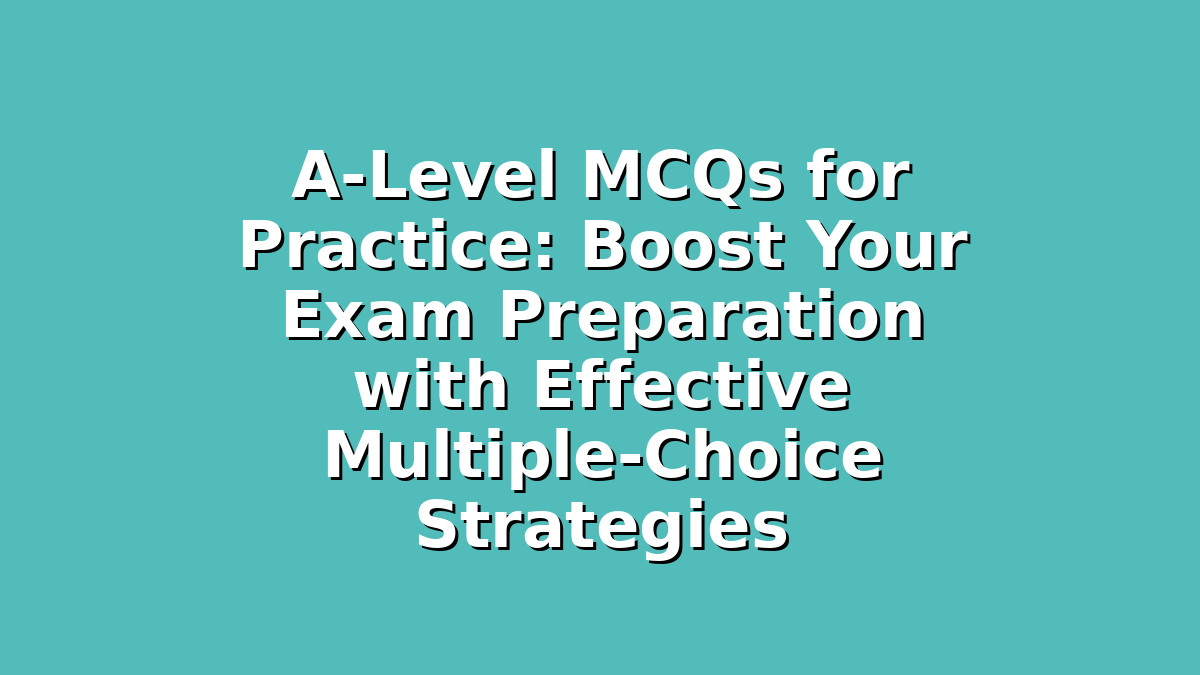Preparing for A-Level exams can be a challenging yet rewarding journey. As students strive to achieve top grades and secure places at their preferred universities, finding efficient and effective study methods becomes crucial. One powerful tool in any student’s revision arsenal is the use of multiple-choice questions (MCQs). Practicing A-Level MCQs not only reinforces knowledge but also enhances exam technique, time management, and confidence. In this article, we’ll explore why MCQs are essential for A-Level exam preparation and share practical tips on how to use them effectively to maximize your study outcomes.
Why Practice A-Level MCQs?
Multiple-choice questions are a common feature in many A-Level subjects, especially in sciences like Biology, Chemistry, and Physics, as well as in Psychology and some Social Sciences. However, even if your exam format doesn’t heavily rely on MCQs, practicing them can still be highly beneficial.
– Reinforce Subject Knowledge: MCQs test specific facts, concepts, and applications, helping to cement your understanding.
– Improve Exam Technique: Getting familiar with question wording and common distractors can reduce mistakes.
– Enhance Time Management: MCQs typically require quicker answers, so practicing them can improve your speed.
– Build Confidence: Knowing you can tackle a broad range of questions reduces exam anxiety.
With these benefits in mind, let’s dive into three key strategies to make the most of your A-Level MCQ practice.
1. Create a Structured MCQ Practice Schedule
One of the biggest challenges in A-Level revision is managing time effectively. A well-planned schedule can make your MCQ practice much more productive.
– Integrate MCQs Into Your Weekly Revision: Don’t leave MCQs as last-minute practice. Instead, allocate specific days or sessions exclusively for MCQ drills alongside other study methods like note-taking or essay practice.
– Focus on One Subject or Topic at a Time: Choose a particular subject or unit (e.g., Genetics in Biology or Equations of Motion in Physics) and complete a set of MCQs targeting that topic. This focused approach helps identify weak areas.
– Use Past Papers and Trusted Question Banks: Official A-Level past papers are invaluable for practice as they reflect the style and difficulty of real exams. Supplement these with reputable online question banks or revision guides.
– Review and Reflect: After each MCQ practice session, spend time reviewing your answers, especially the incorrect ones. Try to understand why your choice was wrong and revisit relevant notes or textbooks to clarify concepts.
By structuring your MCQ practice in this way, you build a habit, cover the syllabus thoroughly, and avoid last-minute cramming.
2. Master the Art of Eliminating Wrong Answers
One of the most important skills for MCQs is the ability to critically analyze each option and eliminate incorrect answers swiftly.
– Read Questions Carefully: Always read the question and all answer choices thoroughly before selecting an option. Sometimes key phrases like “not,” “always,” or “except” change the meaning.
– Use the Process of Elimination: If you’re unsure of the correct answer, cross out options that you know are wrong. Narrowing down choices increases your odds if you need to guess.
– Look Out for Distractors: Examiners often include plausible but incorrect choices to test your understanding. Watch for answers that are too extreme, irrelevant, or inconsistent with principles you’ve learned.
– Consider ‘All of the Above’ or ‘None of the Above’ Carefully: These options require extra caution. Verify each individual statement before choosing them.
– Practice Timing: MCQs demand quick thinking. Set a timer during practice sessions to develop a pace that balances speed and accuracy.
Improving your elimination strategy not only boosts your chances when guessing but also deepens your comprehension by forcing you to analyze each option critically.
3. Use MCQ Practice to Identify and Address Knowledge Gaps
Repeated MCQ practice is an excellent diagnostic tool that highlights your strengths and exposes weaknesses within your subject knowledge.
– Track Your Performance: Keep a log or spreadsheet of your MCQ scores by topic to identify patterns. Which topics consistently yield low scores? These are your priority areas.
– Target Weak Areas With Focused Revision: Once you know where you struggle, revisit textbooks, watch educational videos, or attend extra tutorials on those topics.
– Mix Up Question Difficulty: Don’t always stick to easy MCQs. Challenge yourself with harder questions to stretch your understanding and prepare for tricky exam questions.
– Combine MCQs with Other Study Methods: Use your MCQ results to inform other study techniques such as creating flashcards, summarizing notes, or practicing essay questions related to difficult themes.
– Seek Feedback: If possible, discuss your MCQ mistakes with teachers, tutors, or classmates. Sometimes an explanation from someone else can clarify difficult concepts quickly.
By continuously using MCQs as both a learning and assessment tool, you turn revision into an active process that targets your individual needs.
Conclusion
A-Level exams are a significant milestone, and achieving success requires more than just hard work—it demands smart study strategies. Incorporating multiple-choice questions into your revision routine is a proven way to boost knowledge retention, enhance exam skills, and build confidence. Remember to create a consistent practice schedule, hone your ability to eliminate wrong answers effectively, and use your results to identify and address knowledge gaps.
Stay positive, stay organized, and keep practicing. The more you engage with A-Level MCQs, the more comfortable you will become on exam day. With perseverance and the right approach, you’ll be well on your way to achieving the grades you deserve. Good luck!

Responses